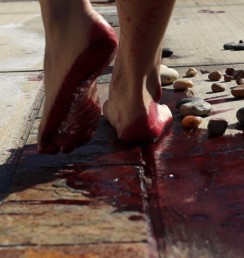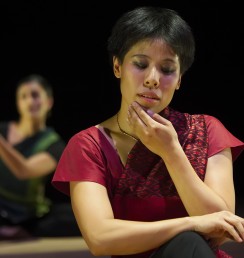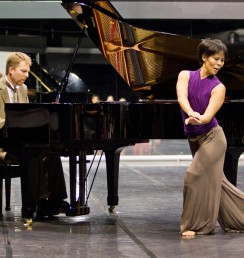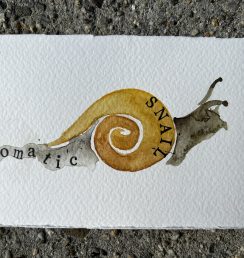Pacific Offering (2017)
“Pacific Offering” is a ritual burning of ancestor letters that completes every live performance of blood run. This rendition of “Pacific Offering” took place in March 2017 on Ohlone land.
conceived of and edited by Cynthia Ling Lee
videography: Meena Murugesan
music: Kaoru Watanabe
ritual participants: Miyuki Baker, Kirsten Brandt, Cynthia Ling Lee, and Thao Ngyugen
A poetic reflection on “Pacific Offering” by participant Miyuki Baker:
“Play, and collect objects that call out to you.”
One enters a cave and says it’s raining in there. One plays by the ocean, sprayed by its foam and salt, frolics to and fro. One washes their face and hair in the salty water. I wiggle my toes in the sand.
We all return carrying kelp of colors ranging from the deepest purple to the lightest green. With pebbles and rocks of varying sizes. With driftwood perforated in lace-like patterns, some long and skinny, others rounded and stonelike. With salty feathers and dry grass.
Cynthia pours millet–the staple grain of the indigenous Taiwanese–out of a bulk produce plastic bag into a rice bowl. Next, she unwraps a package of tobacco and grabbed a handful of it to place into another rice bowl. “For the native Ohlone peoples of this land.” Earlier she dug up a large hole in the moist sandy beach to press a deep metal bowl into. The smaller bowls of grain and tobacco are placed on either side.
Four of us, including one Taiwanese American, one Vietnamese American, one Japanese/Korean American, one Scandinavian American arrange the objects around these three bowls in a sculptural offering.
Cynthia has invited us to the coast of Santa Cruz to participate in a ritual for the ancestors. She calls it Pacific Offering, and it is the ritual completion of her project Blood Run. Part ritual, part performance art, part colonial history inscribed on the body, she had been investigating her Han Chinese colonizer and Taiwanese plains indigenous heritage within the context of larger political histories. This is the second time I’ve participated in a rendition of the project, the first time in Santa Monica, this time in Santa Cruz where she teaches.
That morning I biked to the Bart station, took the train to Fremont, took a bus to San Jose, took another bus to land me in Santa Cruz. As we barreled down the train tracks, I opened my journal to write a letter to my ancestors. Just a week earlier, I was at a conference called Geography of Hope where I wrote a letter from my ancestors to me, so I wrote back.
I face the Pacific. I am on the edge. I imagine the stories of the water. They are laden with painful stories of colonization, enslavement, and war. I think about the powerful message revealed to the world by Standing Rock: water is life. It is what connects us all. We are not of just land but of ocean, river, lake, blood, liquid pathways to embrace our deep interrelatedness.
Cynthia reads a long speech by Tsai Ing-wen, the president of Taiwan, in which she apologizes on behalf of the Taiwanese government to the indigenous Taiwanese people.
. . . Unless we deny that we are a country of justice, we must face up to this history. We must tell the truth. And then, most importantly, the government must genuinely reflect on this past. This is why I stand here today. . . Today’s apology is long overdue, but it is a beginning. I do not expect any one speech or phrase of apology to wipe away four centuries of pain and suffering by the indigenous peoples. But I do hope with all my heart that today’s apology will set this country and all its people on the path towards reconciliation. Please allow me to shed light on this occasion with a piece of indigenous wisdom. In the Atayal language, truth is called “Balay”, and reconciliation is called “Sbalay”, so you simply add an “S” to “Balay”. Truth and reconciliation are in fact two related concepts. In other words, only by facing the truth sincerely can reconciliation be attained.
Cynthia then asks us to dance with gestures we think one of our ancestors might have embodied. We take turns witnessing each other, we dance together, we slow down, we abstract it until the dance is just a thought in our breath.
There is no verbal speaking but I feel my skin prickly with energies of all our ancestors we are bringing together in front of the Pacific. Cynthia lights a match to start the process of burning the letters we’ve written to our ancestors in the large metal bowl. Envelopes puff up before they are consumed tan, shades of brown until black, then grey papery slivers.
Taking her cue from the final silvered letter, Cynthia takes a metal spoon to crush the everything into smaller pieces. I hold out a bowl to her and she fills it up with a spoonful of ash, millet, and tobacco. It’s like zhou, or rice porridge, and I’m in all of the places on this globe where we eat warmed up grains in small bowls, our hands and bellies and mouths nourished.
The ash is still hot and I smell the millet and tobacco burning. Bowl in hands, we each return to the ocean and release the contents into the water.
. . .Sometimes I forget my body, which you stated strongly in the letter that I must move often as a way to connect with you and the land.
When I close my eyes and lean into the world I do indeed feel your warm and gentle hold–it tells me so clearly that I am loved.
I feel my own calling to take forgiveness as an embrace and sweet breeze I can have for all. Not in a patronizing way but one that starts from the point of view that we are all already so uniquely whole and complete.
Your individual stories stir a powerful curiosity in me and I am excited to be going to Japan in two months to start to learn more about some of you.
I thank you for all the living, loving, thriving you did for us all.
Love, Miyuki 3/29/17
The turbulent waves take hold of our offerings and kelp driftwood stone sculptures and spit them out on the other side of the beach like vomit. I hear my ancestors laughing, “Ritual isn’t predictable children, just like life. Embrace the hot mess. Keep dancing.”



